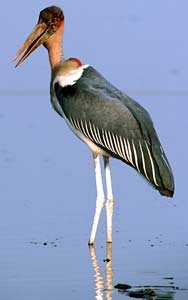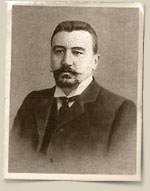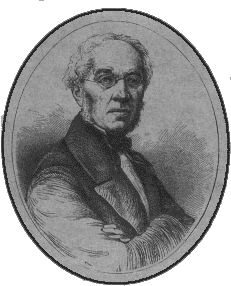|
Thanks to
WilhelmThe2nd from Chessgames.com
- I gleaned the following from our discussions and his untiring
contributions concerning Prince Dadian of Mingrelia and particularly the
Kiev connection.

The Marabou Stork [Leptoptilos
crumeniferus, or Marabu in German]
stands about 5 feet tall, weighs around 20 pounds and sports a 9.5 feet
wingspan. Considered one of the world's ugliest birds, this African carrion and
scavenger, once a scarcity, owes its population boom to the rubbish and trash
that has abounded with the increased, and wasteful, population growth of the
20th century. It loves the
arid climates but lives on the savannahs close to rivers and lakes. Hanging
around with vultures, it will often frequent fishing villages and slaughterhouse
and trash dumps. When
necessary or simply convenient, the Marabou Stork will treat itself to live
rodents, snakes and smaller birds.
Alexander Kuprin

Alexander Ivanovich Kuprin, an almost-forgotten,
but far-from-minor Russian writer, chose the Marabou Stork as the title of
his 1909 short story story, Marabu, based on the legendary Warsaw
Café of turn-of-the-century Kiev.
And so here one day,
loafing, I strayed across a large dark cafe, I frightened off the
doorman’s drowsiness in the first room and passed further in, to a door,
from which emanated the caustic smell of tobacco and bad coffee. Having
entered into the small,
neglected, poorly illuminated room, I made one step and stopped, defeated.
Among clouds of smoke, at a mass of yellowed, marble tables there sat
strange taciturn figures and, long noses lowered down at the tables, they
thought. The hunched shoulders, the strange
collars in the shape of a shaggy pelerines and the heavy, gloomy
expressions - all this strongly reminded me of a row of the same birds
with long noses, with collars around their long naked necks, sitting with
the very same foolish, sad look – the Marabou bird.
Now, it so happens that
Kuprin was friends with Fyodor Ivanovich
Duz-Chotimirsky, a one-time friend and later detractor of Prince
Dadian. According to my staid correspondent:
In his autobiography,
Duz-Chotimirsky tells of being rejected when he applied to study
Astronomy. He met Alexander Kuprin, a friend of his, who tried to console
him saying that chess was a noble game with infinite possibilities.
Duz-Chotimirsky adds, sarcastically, that Kuprin had obviously forgotten
about his story "Marabou" where he describes chessplayers
as a flock of marabou birds.
Alexandre Dimitrievitch Petroff

So, what has all this got to do with Alexandre
Dimitrievitch Petroff (Petrov)?
Not a thing, other than Petroff was the first great Russian chess player and
that the
following refers to him and to Prince Dadian.
According to an old Canadian periodical,
Checkmate:A Monthly Chess Chronicle (Vol.2, #6, March, 1903,
pg.127)
Notes by the Way
It was one
of Anderssen's favorite jokes (so his pupil Zukertort related) to express
doubts whether the famous Russian chess player Petroff really existed.
"Who ever saw him?" the Professor exclaimed. " All his published games are
with persons unknown: he was invented by the Russians to give themselves a
great master."
Similarly, one has heard playful doubts about the mysterious prince
Dadian of Mingrelia, who publishes brilliancies against otherwise unknown
performers at regular intervals. Can there be a syndicate for the
production of Mingrelian games? But perhaps he is real: and the courtiers
around the Mingrelian throne (-where is Mingrelia?) are compelled to play
weak moves until the proper sacrificial opportunity comes to their
sovereign. Ave, Caesar, mataturi te salutant.*
A good composer of sui-mates should make his fortune in
Mingrelia, and might become a court favorite.
*Ave,
Caesar, morituri te salutant
Hail, Caesar, we who are about to die salute you.
[-
SBC]
|

